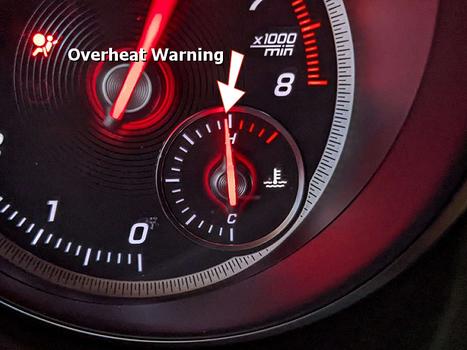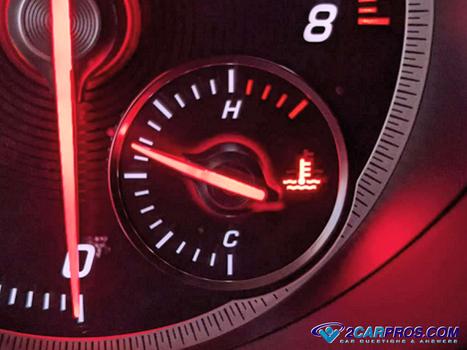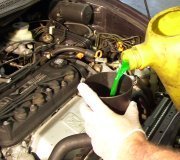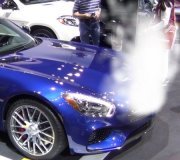
The engine temperature warning light is conveniently located inside the instrument cluster display panel, it's designed to alert the driver that the car's engine is overheating. This light is red because when the engine is overheating serious damage can occur and even engine replacement if the overheating is severe enough. Warning lights generally come in two colors, orange and red. Red is reserved for the more serious malfunctions that need attention immediately while orange is meant to be serviced at your earliest convenience.
What Should You Do?
This will vary depending on where you are at, if you are driving around town pull to the nearest parking lot and shut the engine off, If you are on the highway pull off at the nearest safe place and again, shut the engine off. Do not open or raise the hood, when an engine is overheating there is a danger of getting burned by hot coolant or by the engine itself. Do not attempt to open the engine cooling system, unless the engine has cooled overnight. The engine cooling system is under pressure, usually about 18 psi, also sometimes the car hood can be hot so use caution.
What to Look For?
Once in a safe place leave the hood closed, listen for popping or thumping which can mean the thermostat is stuck closed. On front wheel drive cars listen for the radiator cooling fans, they should be on, also look under the car to see if coolant is leaking onto the ground. This will give you a clue on what to look for to fix the problem. This condition is accompanied by a low coolant level in most cases, also coolant or antifreeze will be forced out of the coolant reservoir when the engine runs hot or over eats because the coolant expands beyond the containment of the reservoir.
Redundant System
When a car is designed with a temperature gauge along with a warning light it is called a "redundant" system, and is used as a failsafe. In this case the warning light works in correlation with the gauge and will only illuminate when the gauge is in the upper range of the gauge span. Never depend on a warning light to illuminate when the temperature gauge is in the "hot" range. If the temperature gauge is in the "hot" range, shut the engine off in a safe place along the highway. Occasionally, the temperature sensor itself can become defective, illuminating the high engine temperature light even though the engine is not overheating.
Engine Temperature Warning Light Common Causes
- Low Coolant Level - When the temperature light comes on the first thing that should be checked is the coolant level. If this level becomes low due to a leak.
- Failed Radiator Cooling Fan Operation - The cooling fan must be operational or the engine will overheat causing the engine temperature light to come on.
- Plugged Radiator - The car radiator must be clear and free form corrosion with clean cooling fins and tubes.
- Failed or Stuck Thermostat - If the engine thermostat fails to open it will not allow the coolant/antifreeze to flow from the engine to the radiator.
Questions?
Our certified technicians are ready to answer engine temperature warning light questions for free. We hope you saved money and learned from this guide. We are creating a full set of car repair guides. Please subscribe to our 2CarPros YouTube channel and check back often for new videos which are uploaded regularly.
Related Car Repair Information
- Why Does an Engine Overheat?
- How to Replace a Radiator
- Why Does an Engine Leak Coolant?
- How to Change Radiator Hoses
- Replacing a Water Pump



